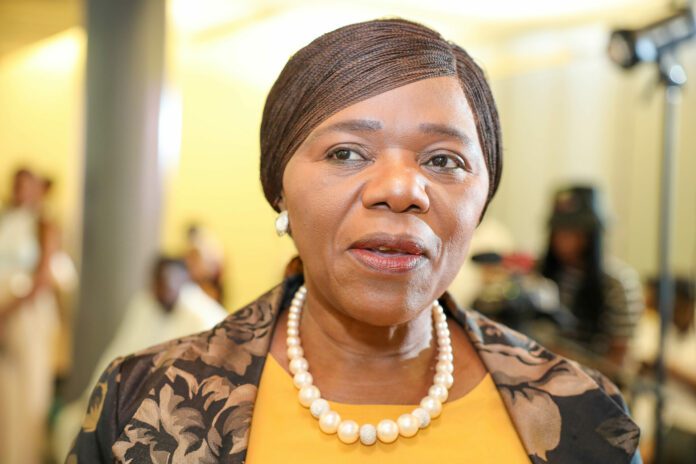Depending on which side of the fence you sit on, former public protector Thuli Madonsela was a star witness this week when she testified before the parliamentary committee probing the fitness of her predecessor, Busisiwe Mkhwebane.
She could have cracked under questioning from advocate Dali Mpofu, but she did not. Perhaps she came close.
If anything, the following startling quote from her would attest to that.
She was asked how she felt that “the same people” in the ANC who had attempted to discredit her after former president Jacob Zuma’s Nkandla report and even the State Capture Report were now praising her.
And she gave the most shocking answer that would haunt her legacy for years to come.
“I am not surprised that I get praised, because we all deal with life based on the new information that we have at any given stage in life,” she said.
“We act according to what we know, what we think, and how we feel. That is what neuroscience tells us. I hold no grudges against anybody who dealt with me in any particular way at any given stage.”
So far so good, but then we get here:
“They did so in terms of what they thought was good for them, or the party, or the country at the time. And the fact that we differ on what we think is good for the country at any given stage does not mean we should always differ.”
This statement has deep implications.
In a brushstroke, Madonsela rewrites history and trivialises the sorry Nkandla episode as a matter of individual opinion. Huh!
Picking the comment apart, it is probably true that ANC MPs who closed ranks around Zuma’s Nkandla flop did it for personal interests. It has become a norm that ANC leaders always prioritise what is best for them and their kin.
It is also true that they could have done it for the party. The ANC is in the space of contesting elections and what the voter thinks matters.
For a long time, party leaders were wary of confirming to the general public that the organisation was infested with a corruption problem.
They would rather deny the cancer of corruption until the opposition turned blue, or even red nowadays. At least, that is until President Cyril Ramaphosa broke ranks and confirmed that the ANC was accused number one in corruption.
But to suggest that the arrogant defence of Nkandla could have been informed by any national interest is taking it a step too far.
Unless Lesotho was just about to invade South Africa, and any instability in the Union Buildings would have compromised national security and rendered the motherland vulnerable. Not.
Some of my old friends in the State Security Agency are the only people I know who defend Nkandla religiously, even in the face of material facts.
That’s fine. Their job is to defend the integrity of the state no matter what. Not Madonsela.
And then comes the slam dunk that the ANC has somehow been persuaded to see the light: “When we have persuaded each other to see a picture that is beyond my paradigm and your paradigm, there is room for some dialectical change.
“I am happy about the changes I see, because they give me hope for our democracy. They give me hope for the country.”
Really? Is the esteemed professor’s Stellenbosch home still in South Africa?
We know the former public protector is in the League of Angels, right? Politically speaking. But watering down Nkandla’s dastardly impact on national conscience is an unexpected low light.
Nothing has been more emblematic of moral decay in the ANC than Zuma’s Nkandla affair. Ramaphosa’s Phala Phala might yet scoop the title.
But that the ANC has had a change of heart towards her is not because the governing party has been born again. It is purely because the ANC has a newly beloved uber-leader that they want to protect from scrutiny in the name of Ramaphosa.
In the history of South Africa, Nkandla represents the ANC’s most brutal assault on the constitution – I’m not an avid fan of parts of the sacred document, but that is the story for another day.
Nevertheless, it is the same constitution that Madonsela champions in every corridor she walks in. There could never be a reasonable explanation, under any circumstances, of why the ANC chose to defecate the constitution.
Madonsela’s sentiments might have seemed kind, well-measured, and reconciliatory, but deep down it smacks of expediency.
At the end of the two-day hearing, it was clear that Madonsela was bitter, because her predecessor, Mkhwebane, failed to appeal a damning high court judgment against her.
Her feelings of betrayal were evident when it came to the stinging court rulings against her in the case of the National Empowerment Fund (NEF) in 2017, and the South African Bureau of Standards (SABS) in 2019.
In the NEF case, the court ruled that Madonsela acted outside her authority, her logic was “hard to follow” and some of her recommendations were “inappropriate, unreasonable, and irrational”.
In the SABS matter the court ruled that “the starting point of the investigation was thus wrong, bad in law and irrational”.
Notably, Mkhwebane faces similar charges. But even though the betrayal may hurt, Madonsela cannot downplay Nkandla.
For more political news and views, click here.
Follow @SundayWorldZA on Twitter and @sundayworldza on Instagram, or like our Facebook Page, Sunday World, by clicking here for the latest breaking news in South Africa. To Subscribe to Sunday World, click here.



